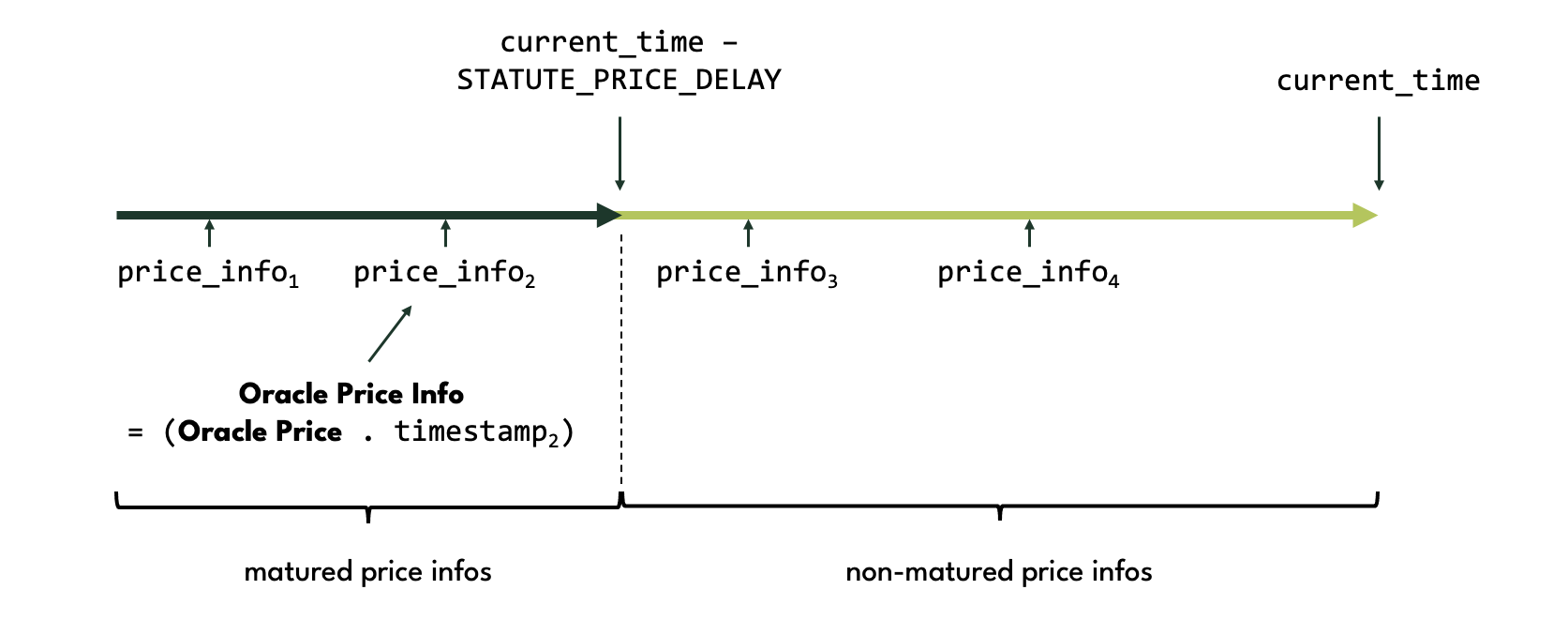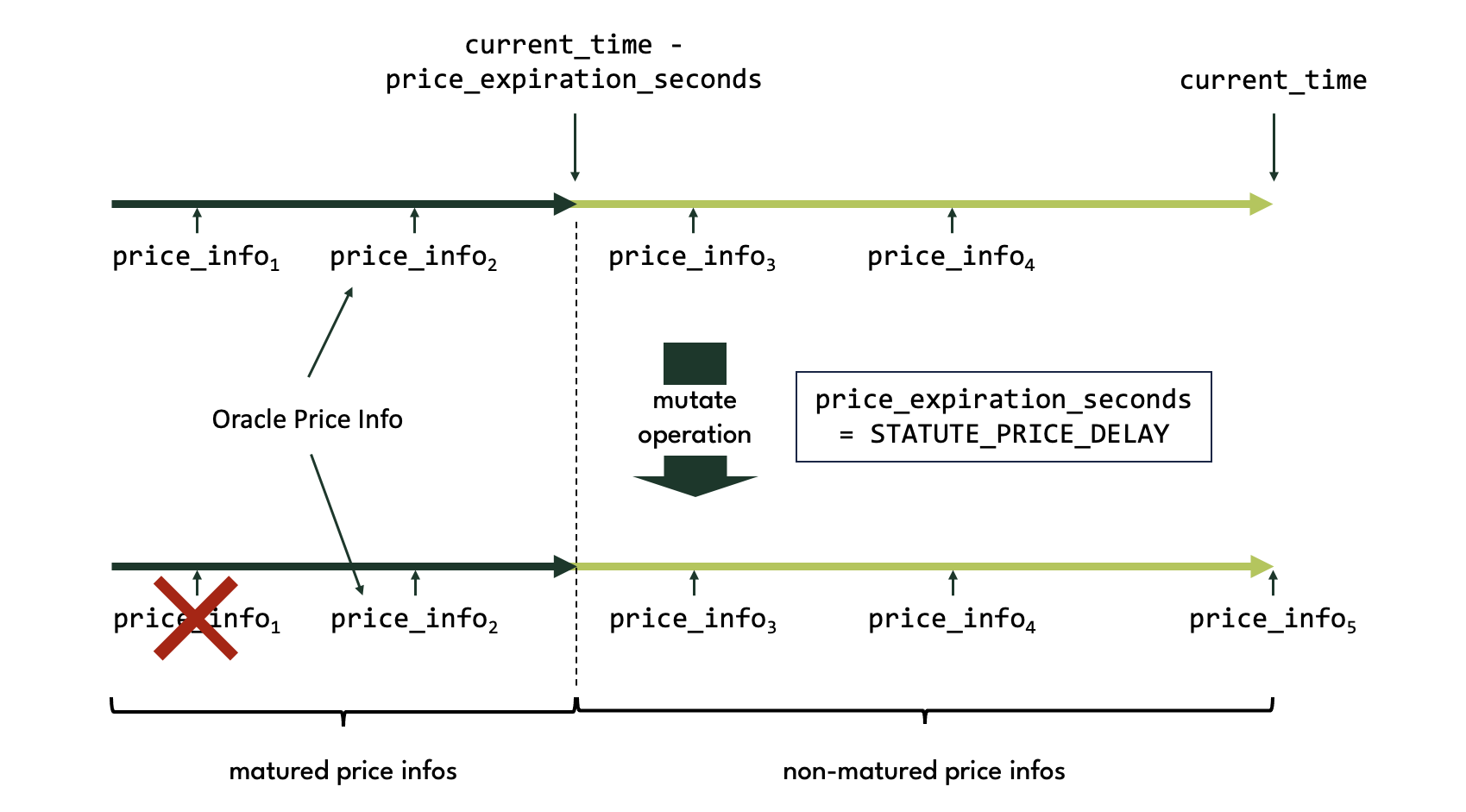Price Oracle
The Price Oracle, or Oracle for short, is a standard singleton with inner puzzle oracle.clsp.
It's main purpose is to provide an XCH/USD price to the Protocol. This price is referred to as the Oracle Price.
However, the Protocol does not dirctly query the Oracle for the Oracle Price when performing operations. Instead, it keeps a copy of the Oracle Price in the state of the Statutes coin, the Statutes Price, and uses this value for all protocol-internal operations that require the XCH/USD price. This has the benefit of not having to spend the Oracle coin every time an operation needs access to the XCH/USD price.
Also, note that the Oracle Price, and hence the Statutes Price, is delayed vs the XCH/USD price published by the Announcers. The delay is given by the STATUTE_PRICE_DELAY Statute. This is a last-resort protection for protocol users against failing or misbehaving Announcers, and allows them to take action before an incorrect Statutes Price becomes effective. E.g. a borrower could repay all their loans before getting liquidated on the basis of an incorrect Statutes Price.
Price infos
Because the Statutes Price is delayed, the Oracle keeps a price history in the PRICE_INFOS state variable. PRICE_INFOS is a list of price infos, where each price info is a two-element struct consisting of a price and corresponding timestamp. Each such price is referred to as an Oracle price ('price' with a lower 'p').
PRICE_INFOS = (price_info_1 ... price_info_n)
= ((price_1 . timestamp_1) ... (price_n . timestamp_n))
Price infos in the PRICE_INFOS state variable are ordered in ascending chronological order, i.e. the price info with the lowest (i.e. oldest) timestamp comes first, the one with the highest (i.e. most recent) timestamp last.
A price info is called matured if its timestamp is less than the current timestamp minus STATUTE_PRICE_DELAY.
Below an example where PRICE_INFOS contains four price infos, two of them matured, two of them not matured.

The Oracle Price Info is defined to be the matured price info with the most recent timestamp. The price contained in this price info is the Oracle Price.
Upgradability
The Oracle is tied to Circuit protocol more loosely than other components. Conceptually, this makes sense because providing off-chain data on-chain is at its core a standalone activity that could be performed independently of Circuit protocol.
The main contact point between the Oracle and the rest of Circuit is the update price operation of Statutes. This is a fairly generic operation which could also be implemented by other protocols that want to use the prices provided by the Oracle. The operation asserts the following message from a puzzle announcement:
(sha256tree (c price (c updated_timestamp (c current_timestamp STATUTE_PRICE_DELAY)))))
It also verifies that the puzzle from which the announcement is broadcast is that of a standard singleton with launcher ID given by STATUTE_ORACLE_LAUNCHER_ID. Since this Statute is mutable, governance can replace the Oracle with another standard singleton that is able to announce the above message.
In theory, it would be possible for a different Oracle to use Announcers with different announcer mod (or not have Announcers at all). In this case however a crucial feature of the Oracle design would get lost, namely the ability for the protocol to reward data providers. Since the Announcer mod hash is hardcoded in the Announcer Registry mod, which in turn is hardcoded as an Approval mod, it would no longer be possible to claim Rewards from the Announcer Registry, and would remove the incentive structure that helps retain high quality data providers.
Operations
Puzzle that operations are performed on: oracle.clsp
The Oracle does not have an owner.
Keeper operations:
- mutate: update Oracle price infos - puzzle: oracle_mutation.clsp
- announce: announce the Oracle Price Info - puzzle: oracle.clsp
Mutate
The mutate operation updates the PRICE_INFOS state variable. This is also referred to as updating the Oracle price.
Firstly, the mutate operation creates a new price info struct and appends it to PRICE_INFOS. The new price info is generated by selecting at least M-of-N Announcers and announcing their prices. The mutate operation then calculates a new price as the (lower) median of the selected Announcer prices. This new price together with the current timestamp forms the new price info.
Secondly, the mutate operation also trims the PRICE_INFOS list.
The mutate operation retains only the most recent matured price info as well as all non-matured price infos. All other matured price infos are discarded. These are the trimmed Oracle prices.

The diagram above illustrates how the mutate operation updates PRICE_INFOS. Initially, PRICE_INFOS contains four price infos, two of them matured, two of them not matured. One discarded, and a new price info appended to PRICE_INFOS. In this particular example, one price info gets discarded (price_info_1), leaving the total number of price infos stored in PRICE_INFO unchanged.
Note that it is possible for there to be no matured price info. This can happen immediately after protocol deployment or if governance has increased STATUTE_PRICE_DELAY.
State changes
PRICE_INFOS: The mutate operation appends exactly one new price info to thePRICE_INFOSlist. It may discard zero or more price infos from the beginning or thePRICE_INFOSlist.
Announce
The primary purpose of the announce operation is to update the Statutes Price. The Oracle coin announces the Oracle Price Info, which is asserted by a price update spend of the Statutes coin. When used in this way, the announce operation must use STATUTE_PRICE_DELAY for the price_delay argument of the solution, so that the price info announced by the Oracle is the most recent price info with timestamp < current_time - STATUTE_PRICE_DELAY.
State changes
The announce operation does not change the state of the Oracle. In particular, it does not trim the PRICE_INFOS list.
State and lineage
Fixed state:
MUTATION_PROGRAM_HASH
Immutable state:
MOD_HASHSTATUTES_STRUCT
Mutable state:
PRICE_INFOS
Eve state
The eve state of the Oracle has PRICE_INFOS = (list (price . timestamp)), which is set by the protocol deployer. Here, price should be the current price, ideally derived from Announcers that are already running and derived using the same methodology that Oracle mutate operation uses, and timestamp should simply be the current timestamp at the time of deployment.
Amount
The amount of the Oracle coin is always 1.
Lineage
Since the Oracle is a standard singleton, it requires a standard lineage proof to be spent.